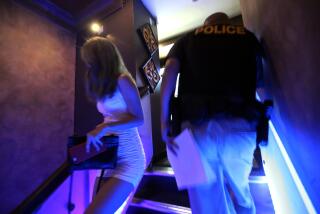For Communist Guerrilla, 70, Korean War Fervor Burns
INCHEON, South Korea — Chung Soon-Duk, the last communist guerrilla to be caught in South Korea, laments her “pathetic mess.” She lost her right leg to a wound 40 years ago, and her left side is paralyzed from a stroke. She is hospitalized and needs a wheelchair to get around.
Yet when she recalls her days as an “anti-American unification warrior,” the 70-year-old woman brims with bravado. She belts out old rebel songs, pumping her arm -- the only limb she can use -- to the beat:
“Comrades, shoulder your rifles. It’s time for battle. Blizzards hit hard, but our hearts are boiling with hot blood. ... We have orders, comrades, orders to search for the enemies.”
Her life on the run ended in a shootout with police in the rugged Chiri Mountains on Nov. 12, 1963 -- a decade after the Korean War ended. “Disoriented communist bandit caught!” read a headline at the time.
With her arrest, South Korea finally declared an end to drawn-out operations against peasant “partisans” who fought the pro-U.S. government in Seoul long after the war. For Chung, the war never ended.
“All my life, I have been a unification warrior who struggled to free the fatherland from the Americans,” she says at the hospital in Incheon, west of Seoul, where she lives.
Released from prison in 1985, Chung was a disabled outcast, disowned by her family because of her tainted past. Police followed her, and she held only menial jobs.
She associated with former rebels, but in 2000 the last of her comrades were allowed to go to North Korea, where they got a hero’s welcome.
Chung was barred from joining them because South Korea returned only “unconverted” guerrillas. Faced with miserable prison conditions, Chung had signed a letter disavowing communism in hopes of getting better medical care and a reduced sentence.
She now regrets signing the paper. All she has left are her political beliefs and hatred of Americans. She calls reports of hardships in North Korea exaggerations and justifies the North’s suspected development of nuclear weapons as defensive.
She blames the division of the Korean Peninsula on the U.S. troops who occupied the southern half as the Soviets took over the north to disarm Japanese colonialists at the end of World War II.
Chung’s saga began shortly after she married at 16, when North Korea invaded the South in June 1950. Her peasant husband, Sung Suk-Jo, collaborated with North Korean troops who promised “liberation” from landlords. He was among thousands of leftists who took up arms in the thick forests and jagged ravines of the Chiri Mountains when the tide of war changed.
Chung fled too and found her husband, but married couples were not allowed to fight in the same unit. She last saw her husband in January 1952 sitting before a bonfire in a snow-covered field. She heard later that he died in battle.
As the war dragged on, she learned to read and write, worked as a cook and nurse and was promoted to deputy platoon leader, raiding police stations and ambushing South Korean police rangers, called “dogs” by the rebels.
By 1955, most of the Chiri Mountain guerrillas had been killed or surrendered, but Chung and others fought on even though they had no communication with North Korea.
Police hunted them but also distributed leaflets promising leniency if they gave up. Chung’s parents, coerced by police, roamed the hills pleading through a loudspeaker: “Soon-Duk, please come down the hill and surrender!”
Chung’s unit dwindled to herself and two men, but they continued to elude capture. According to police records, Chung and one of her comrades, Lee Hong-Yi, were scrounging for food in October 1962 and got into a scuffle with a villager who tried to snatch Lee’s loaded carbine.
“I shot the villager in the leg. We went on to kill his wife and his brother and his brother’s wife. We burned down their homes,” Chung recalled recently. “They were pawns of American imperialists trying to turn in fellow compatriots. I have never killed innocent villagers. I have no regrets.”
That December, Chung’s other comrade, Lee Eung-Jo, 53, was wounded as police tracked the fugitives. Chung says she was unable to carry him and finished him off -- at his request and in “the true spirit of comradeship.”
The following November, during a foray into a village, a peasant pressed an alarm, alerting two policemen lying in wait. Lee Hong-Yi was killed and Chung was shot in her right thigh.
“Even bleeding, she was crawling to her carbine. I quickly overpowered her,” says Park Ki-Duk, one of the policemen who shot Chung.
“She cursed us endlessly, calling all kinds of names and demanding that she be killed. Later I gave her some milk, and she threw it away,” he said. “She was one tough broad. It’s scary what communism does to an ignorant woman.”
Doctors amputated Chung’s leg. She was convicted of murder, arson, robbery and theft and sentenced to life imprisonment.
“She raved and ranted, jerking her crutches and cursing the judge for not giving her the death sentence,” recalls Kim Young-Kook, Park’s fellow officer.
In 1999, Chung suffered a stroke. Now she shares a hospital room with five other patients. She reads magazines and books sent by sympathetic activists and is visited by a Christian pastor.
Gray-haired and rotund, Chung refers to Americans as “bastards” and once lashed out at a patient who mentioned North Korean leader Kim Jong Il without the title “chairman.”
“Don’t take me lightly. I can still fight. I still feel like standing up and climbing the mountains,” Chung says from her wheelchair.
More to Read
Sign up for Essential California
The most important California stories and recommendations in your inbox every morning.
You may occasionally receive promotional content from the Los Angeles Times.










